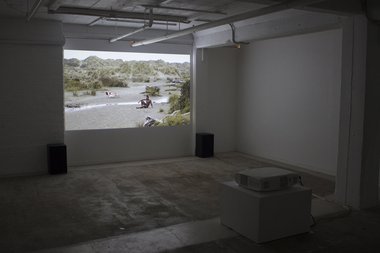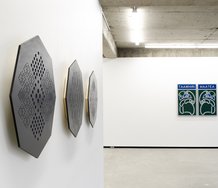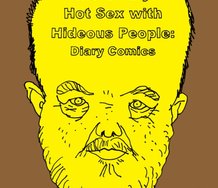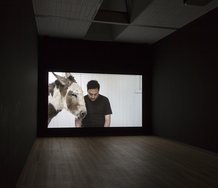Jessica Hubbard – 27 February, 2018
Landscape usage in this project is also interesting, given its title and theme, land being introduced as another subject and another object of human dominance. Aotearoa/New Zealand is permanently altered by human reshaping.
Christopher Ulutupu’s show draws on the casual fetishisation of the romanticised ‘other’ through the eye of the camera. From ethnography to pinups, European culture has turned people with less money and less power into objects to be looked at. From the moment they arrived in the Pacific, people of European descent have projected their own fantasies, desires, and ways of thinking onto those they have met. Shaped by the enlightenment project in which everything became scientifically ordered, knowable, objective, and hierarchical they have frequently failed to see their own biases and assumed the right to knowledge and power.
The Romantic Picturesque directly engages with this topic, particularly looking at the performative and displayed nature of this relationship. It does so from the point of view of those traditionally being looked at. It raises questions about the subjectivity and agency of the performers, and the choices and decisions being made.
This work engages with two art traditions in particular, photography and poetry, but in their bastardised low art versions: video and karaoke. In doing this the artist brings the coupling of class and race into the discussion. Photography is present both in a large format film camera and in arranged video stills where the subjects of the work are kept motionless against a moving landscape. Poetry introduces each scene of karaoke and stills. In her introduction Dilohana Lekamge mentions the artist’s declaration that “karaoke is the strongest form of poetry”. It speaks of love and hardship. Both low and high art forms are treated with weight and love.
The performers in this work are put on display in ways that echo European photographic traditions, both ethnographic and pinup, but also in ways that speak of performative choice and pride. This juxtaposition left me feeling both appreciative and uneasy. A young girl practices her marching routine in a relentless loop-proud and determined. The karaoke singers sing beautifully with passion in front of an engaged but largely expressionless small audience of one or two. While the singers have agency, the song, background, and possibly the clothing may have been selected by the artist. This echoes back to the earlier tradition of display of Pasifika people. The singers are complicit in the display and I wonder how much agency they have.
Landscape usage in this project is also interesting, given its title and theme, being introduced as another subject and another object of European dominance. Aotearoa/New Zealand is permanently altered by European reshaping. The small girl in uniform practices her marching routine flanked by ubiquitous introduced pines which make the soil too acid for anything else to grow. A man walks through grass backed by a scrubby slope. Karaoke is performed in a vine-infested non-space or by an empty oceanless beach.
Landscape, as something we go to see rather than somewhere we live, is a recent concept, now the object of our gaze, something to beautify and change. Aotearoa serves as a fascinating and disturbing example of the European (and human) relationship with the land. The burning off of bush, land reclamation, and the introduction of non-native species has irrevocably changed its look and nature so the non-spaces of these videos function as sad reminders, echoing the arrogance of power and human domination.
Jessica Hubbard

 Two Rooms presents a program of residencies and projects
Two Rooms presents a program of residencies and projects Advertising in this column
Advertising in this column



This Discussion has 0 comments.
Comment
Participate
Register to Participate.
Sign in
Sign in to an existing account.